 Petzlover
Petzlover Border Terrier is originated from United Kingdom but Bordoodle is originated from United States. Border Terrier may grow 15 cm / 5 inches shorter than Bordoodle. Border Terrier may weigh 20 kg / 44 pounds lesser than Bordoodle. Both Border Terrier and Bordoodle has same life span. Both Border Terrier and Bordoodle has almost same litter size. Border Terrier requires Moderate Maintenance. But Bordoodle requires Low Maintenance
Border Terrier is originated from United Kingdom but Bordoodle is originated from United States. Border Terrier may grow 15 cm / 5 inches shorter than Bordoodle. Border Terrier may weigh 20 kg / 44 pounds lesser than Bordoodle. Both Border Terrier and Bordoodle has same life span. Both Border Terrier and Bordoodle has almost same litter size. Border Terrier requires Moderate Maintenance. But Bordoodle requires Low Maintenance
 As a working dog, the Border Terrier comes from the border country between England and Scotland. To be more specific, the dog originates from the rough hill country in the areas on both sides of the border between England and Scotland – an area known as 'The Border Country'. The breed was developed by the farmers, using the Terriers to help contain the fox population.
As a working dog, the Border Terrier comes from the border country between England and Scotland. To be more specific, the dog originates from the rough hill country in the areas on both sides of the border between England and Scotland – an area known as 'The Border Country'. The breed was developed by the farmers, using the Terriers to help contain the fox population.
It is believed that they are related to other kinds of terriers which also came from this region such as the Bedlington- and Dandie Dinmont Terriers. The first Border Terrier was registered in 1913 with the British Kennel Club. Later, the Border Terrier Club was also formed. A club for these dogs was also registered in the United States in 1930.
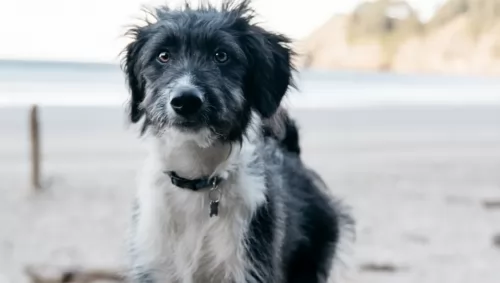 Known also as a Borderpoo or Borderdoodle, the Bordoodle is a designer- or hybrid breed which hails from the United States of America.
Known also as a Borderpoo or Borderdoodle, the Bordoodle is a designer- or hybrid breed which hails from the United States of America.
Both the dogs used in the development of this cross-breed are the Poodle and the Border Collie, and both these dog breeds have their own lengthy histories.
The history of the Bordoodle is short, as it is a modern crossbreed which has been purposefully bred by breeders to bring about a dog with certain looks and temperament.
 The Border Terrier is a small to medium sized dog, weighing roughly between 5- and 7kg and standing at anything between 28 and 40cm in height. With his dark brown eyes and keen, alert expression, and with ears dropping forward, people describe the head as being like that of an otter. He is a courageous worker and a loyal companion but some people may not take kindly to him wanting to dig under-, or climb over barriers to get out to follow a scent or to go exploring.
The Border Terrier is a small to medium sized dog, weighing roughly between 5- and 7kg and standing at anything between 28 and 40cm in height. With his dark brown eyes and keen, alert expression, and with ears dropping forward, people describe the head as being like that of an otter. He is a courageous worker and a loyal companion but some people may not take kindly to him wanting to dig under-, or climb over barriers to get out to follow a scent or to go exploring.
The Border Terrier is a rough coated dogs of medium size with narrow build. The dog’s height is slightly greater than the dog’s length. The coat can be tan and black or dark grey. Sometimes the coat is described as grizzle - dark tipped hairs which give an overlay of color to the tan or red coat. You can also possibly find some white on the muzzle or chest. He has a double coat, with the outer coat being short, dense and wiry. The tail is of medium length and the ears drop forward toward their cheeks.
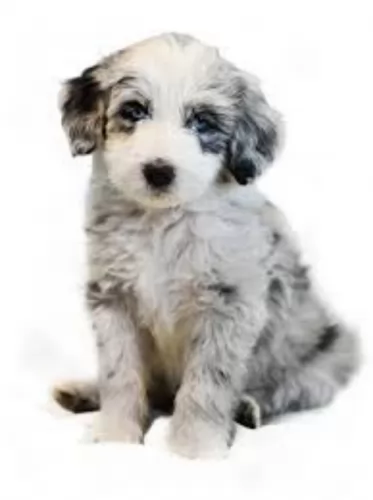 The Bordoodle isn’t a purebred dog but is a cross between a Poodle and a Border Collie.
The Bordoodle isn’t a purebred dog but is a cross between a Poodle and a Border Collie.
He has a soft, medium length coat which is inclined to be wavy. Colors are essentially black and white but chocolate, cream, fawn, merle and grey are also seen.
He is a medium sized dog standing at between 38cm and 55cm and weighing between 13kg and 27kg. The long tail is feathery, the ears floppy or semi-erect and the brown eyes are bright and intelligent. The muzzle is medium to long.
As with any mixed breed dog, the Bordoodle can take after either parent dog but generally the Borderdoodle will be a medium sized dog.
With the Bordoodle you can expect nothing less than a highly intelligent dog. That is because both the Poodle and the Border Collie are super intelligent dogs so the Bordoodle is guaranteed to have got a good portion of this intelligence from both breeds.
It makes training and socialization easy for the dog. It is important for your Bordoodle to be trained and socialized if you want him to be obedient and relaxed around strangers and other pets. As it is, his amicable nature makes the hybrid dog of yours a great family pet – getting on well with other pets in the home as well as with children.
Apart from being such a smart dog, the Bordoodle is active, playful, loving and devoted – everything a serious dog owner wants in a pet. This is a dog that doesn’t really know the meaning of the word aggressive.
 A Border Terrier is a dog that has to be part of the family. You can’t just stick him in your back yard as he will just pine away with unhappiness. Boredom and loneliness will cause him to bark and he has a loud bark. He’ll become destructive – characteristics that aren’t his fault because he didn’t ask to be bought and just stuck away.
A Border Terrier is a dog that has to be part of the family. You can’t just stick him in your back yard as he will just pine away with unhappiness. Boredom and loneliness will cause him to bark and he has a loud bark. He’ll become destructive – characteristics that aren’t his fault because he didn’t ask to be bought and just stuck away.
Train and socialize your Border Terrier so that he becomes the great dog he is intended to be. He gets on well will children who have been taught to be kind to animals and he will get along with other pets in the home. The Border Terrier is an affectionate, sensitive dog and once trained he is willing to obey your commands.
The Border Terrier isn’t the greatest guard dog but is best known for his loving, devoted and loyal nature. He loves his food, and if you feed him well, provide him with a warm, dry place to sleep and provide him with lots of attention and exercise, you’ll have the most devoted and loving friend for life.
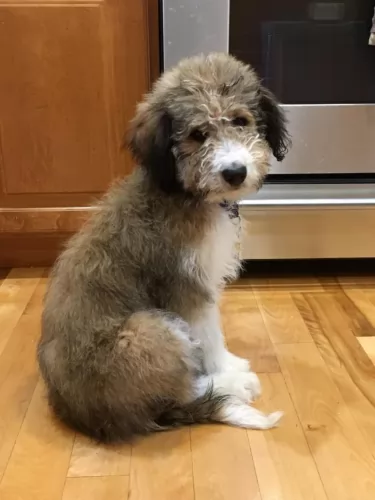 Bordoodles have two great dog breeds to thank for the way they turn out. When you think of the Border Collie and Poodle, you know you’re going to get a dog that is friendly, social, playful, loving and devoted – the ideal family pet.
Bordoodles have two great dog breeds to thank for the way they turn out. When you think of the Border Collie and Poodle, you know you’re going to get a dog that is friendly, social, playful, loving and devoted – the ideal family pet.
Intelligent, he is easy to train too, and with excellent care, you’re going to have a most wonderful family pet and companion, full of fun and life.
 Border Terriers are a healthy breed and with good food and plenty of love and attention, they can reach 14 years of age. It is to be noted with this dog breed that he doesn’t show signs of pain or sickness easily so you want to watch him closely.
Border Terriers are a healthy breed and with good food and plenty of love and attention, they can reach 14 years of age. It is to be noted with this dog breed that he doesn’t show signs of pain or sickness easily so you want to watch him closely.
Canine Epileptoid Cramping Syndrome - This is a disease which can be evident from 7 months of age already. The disease was once known as Spike's Disease, and its an hereditary disease of Border Terrier dogs. The cause of the disease is unknown but it is similar to canine epilepsy. It is thought that a contributing factor can be gluten, so a gluten-free diet will be recommended.
Heart defects can also affect Border Terriers, one of which is pulmonic stenosis. This is a narrowing of the valve which separates the right chamber of the heart from the lungs. It can ultimately lead to arrhythmia to congestive heart failure. He’ll have difficulty with breathing, suffer from abdominal distension and won’t be able to exercise properly.
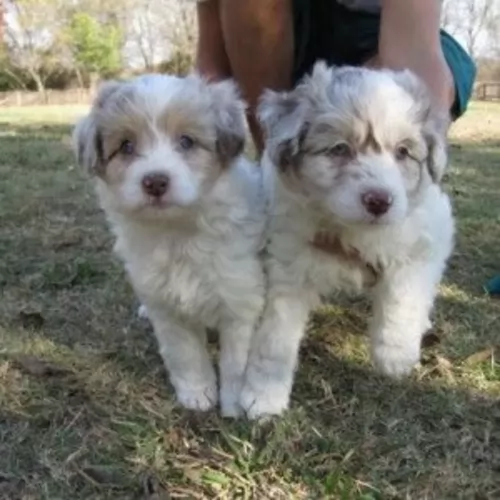 Bordoodles, when well cared for, can live to be 12-15 years of age. There aren’t going to be many health issues to contend with with your Bordoodle as there are no known health problems in this robust breed.
Bordoodles, when well cared for, can live to be 12-15 years of age. There aren’t going to be many health issues to contend with with your Bordoodle as there are no known health problems in this robust breed.
Nonetheless there are some common dog illnesses that you need to be aware of such as progressive retinal atrophy, hip dysplasia and hypothyroidism.
With hypothyroidism, the thyroid gland in the neck of your pet produces a hormone known as thyroxine that controls metabolism, but the disease hypothyroidism makes it that the gland doesn’t make enough thyroxine. Signs that your dog has this illness includes a dull coat, inflamed skin and even hair loss.
Get him to the vet immediately who will do blood tests and provide treatment. Mercifully it isn’t something that is life-threatening.
 Because the topcoat of the Border Terrier is dense and harsh with a thick undercoat, he will require moderate grooming. He doesn’t shed too much. Brush your Border Terrier twice a week to remove dead hair and keep your dog’s coat healthy. As part of his grooming, keep his nails clipped as well as his teeth checked and brushed at least twice a week. Make use of specialized dog toothpaste and brush.
Because the topcoat of the Border Terrier is dense and harsh with a thick undercoat, he will require moderate grooming. He doesn’t shed too much. Brush your Border Terrier twice a week to remove dead hair and keep your dog’s coat healthy. As part of his grooming, keep his nails clipped as well as his teeth checked and brushed at least twice a week. Make use of specialized dog toothpaste and brush.
The Border Terrier can quickly put on weight so it is important to feed him according to the instructions on the packaging if you’re going to be feeding him with commercially manufactured dog food. Make sure its a quality brand and one which caters for his energy requirements.Dogs are individuals, and they don’t all eat the same amount. As a responsible dog owner, it is up to you to monitor your pet and understand his unique requirements.
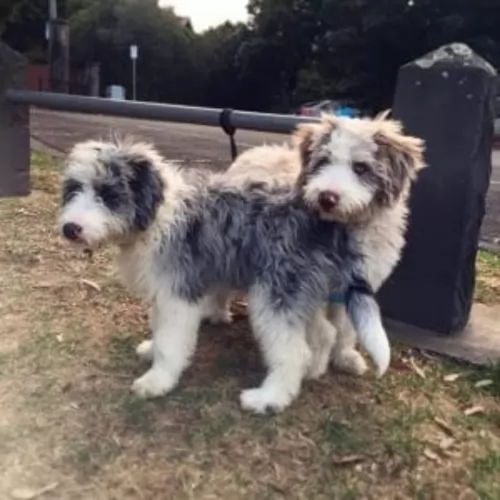 The Bordoodle is a dog which doesn’t shed that much so his grooming requirements are low and he is considered as a hypoallergenic dog.
The Bordoodle is a dog which doesn’t shed that much so his grooming requirements are low and he is considered as a hypoallergenic dog.
He will need to have his coat brushed at least twice a week to keep it shiny, soft and smooth. Depending on how your Bordoodle turns out, he may even require trimming at a professional groomer.
Make time to check his ears inside and out and learn how to clean the inside of his ears to avoid infection and wax build-up.
Dental hygiene is also imperative in dogs, and neglecting to do this will mean food particles and bacteria accumulating along your pet’s gumline, resulting in gingivitis and periodontal disease.
Every dog will require regular exercise and you can get your Bordoodle to join you in your walks. He is the kind of dog that can happily adjust to city or country life, but he will still need to have some ball games and other activities to keep him busy and happy.
He isn’t a dog that can be left alone day after day in the backyard. He is social and playful and loves the companionship of his human family.
If you feed your Bordoodle kibble from some of the top quality commercially produced foods, always research the dog food and take a good look at the ingredients.
The pet food you choose plays an important role in the longevity of your pet. There are commercially manufactured foods that have such poor ingredients that they can actually shorten your pet’s lifespan and cause stress to the kidneys and liver.
If in any doubt about what to feed your Bordoodle, speak to your vet. Cooked brown rice, cooked vegetables and cooked chicken can sometimes be mixed into your pet’s kibble. Raw meat should also occasionally be added in to ward off skin allergies.